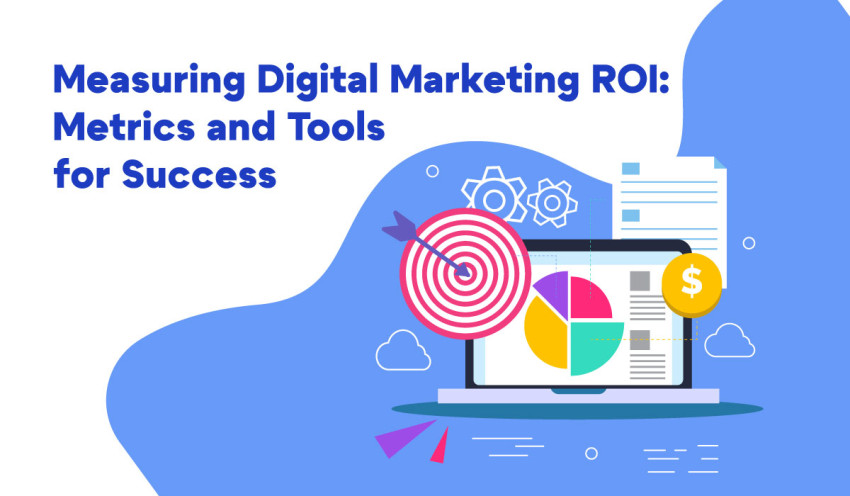
In today's digital age, businesses invest heavily in digital marketing to reach and engage with their target audiences. However, the success of these efforts isn't solely determined by the size of the budget or the number of campaigns run. To truly gauge the effectiveness of digital marketing, measuring Return on Investment (ROI) is essential. In this blog, we'll explore the significance of measuring digital marketing ROI and delve into the key metrics and tools that can help businesses track and optimize their digital marketing efforts.
The Importance of Measuring Digital Marketing ROI
Before we dive into the metrics and tools, let's understand why measuring digital marketing ROI is so crucial:
1. Resource Allocation
Measuring ROI helps businesses allocate their resources more effectively. By identifying which digital marketing channels and strategies provide the highest returns, companies can optimize their budgets and efforts accordingly.
2. Performance Evaluation
ROI measurement allows businesses to evaluate the performance of individual campaigns and marketing channels. This assessment helps in identifying what's working and what needs improvement.
3. Informed Decision-Making
Measuring ROI provides valuable insights that guide future marketing decisions. Businesses can make informed choices about where to invest their marketing dollars and refine their strategies based on data-driven insights, suggest some top result oriented digital marketing agencies in Bangalore.
4. Accountability
ROI measurement holds marketing teams accountable for their efforts. It sets clear expectations and helps determine whether marketing campaigns are achieving the desired outcomes.
Now that we understand why measuring digital marketing ROI is essential, let's explore the key metrics and tools to help businesses track and analyze their digital marketing performance.
Key Metrics for Measuring Digital Marketing ROI
Customer Acquisition Cost (CAC): CAC measures the cost of acquiring a new customer. It includes expenses related to advertising, marketing campaigns, and sales efforts. To calculate CAC, divide the total marketing and sales expenses by the number of new customers acquired during a specific period.
Conversion Rate: The conversion rate measures the percentage of website visitors who take a desired action, such as making a purchase, signing up for a newsletter, or filling out a contact form. A higher conversion rate indicates that your marketing efforts are effectively driving user actions.
Click-Through Rate (CTR): CTR measures the effectiveness of your online ads. It calculates the percentage of users who click on your ad after seeing it. A higher CTR suggests that your ad copy, design, and targeting are resonating with your audience.
Cost Per Click (CPC): CPC represents the amount you pay for each click on your digital advertising. It helps you assess the efficiency of your paid advertising campaigns and control your advertising costs.
Customer Lifetime Value (CLV): CLV estimates the total revenue a customer is expected to generate throughout their relationship with your business. It's essential for understanding the long-term impact of your marketing efforts.
Return on Advertising Spend (ROAS): ROAS measures the revenue generated for every dollar spent on advertising. To calculate ROAS, divide the revenue generated from ads by the advertising costs. A ROAS greater than 1 indicates a positive return on investment.
Churn Rate: Churn rate quantifies the percentage of customers who stop using your products or services over a specific period. Lowering churn is often more cost-effective than acquiring new customers, making it a crucial metric for ROI.
Email Marketing Metrics: For email campaigns, metrics like open rate, click-through rate, and conversion rate are essential for measuring ROI. These metrics help gauge the effectiveness of your email marketing efforts.
Social Media Metrics: Metrics such as engagement rate, follower growth, and social shares provide insights into the performance of your social media marketing. These metrics help assess brand visibility and audience engagement.
Tools for Measuring Digital Marketing ROI
Google Analytics: A powerful and widely used analytics tool, Google Analytics provides in-depth insights into website traffic, user behavior, and conversion tracking. It's essential for measuring the effectiveness of various digital marketing channels.
Google Ads and Facebook Ads Manager: These platforms offer robust tools for tracking the performance of paid advertising campaigns. You can analyze metrics like CPC, CTR, and conversion tracking to evaluate ROI.
Marketing Automation Software: Tools like HubSpot, Marketo, and Mailchimp offer comprehensive marketing automation features, including email marketing and lead tracking. They provide detailed analytics to measure the effectiveness of your campaigns.
Customer Relationship Management (CRM) Software: CRM systems like Salesforce and Zoho help businesses manage customer data and interactions. They enable you to track customer behavior and measure the impact of marketing efforts on sales.
A/B Testing Tools: Tools like Optimizely and VWO allow you to conduct A/B tests on various elements of your website or marketing campaigns. These tests help optimize conversion rates and, consequently, ROI.
Social Media Analytics Tools: Platforms like Sprout Social, Hootsuite, and Buffer offer social media analytics features that help you track engagement, follower growth, and social ROI.
Heatmapping and Session Recording Tools: Tools like Crazy Egg and Hotjar provide visual insights into user behavior on your website. These tools help identify areas for improvement in your digital marketing efforts.
Attribution Modeling Tools: Tools like Google Attribution and Adobe Analytics allow you to analyze how different touchpoints contribute to conversions. They help you understand the customer journey and allocate credit appropriately.
Custom Dashboards: Services like Google Data Studio and Tableau enable you to create custom dashboards that consolidate data from multiple sources. This allows for a comprehensive view of your digital marketing performance.
Conclusion
Measuring digital marketing ROI is a fundamental practice for businesses looking to succeed in the digital landscape. By focusing on key metrics and leveraging the right tools, organizations can gain valuable insights into the effectiveness of their marketing efforts. These insights empower businesses to make informed decisions, optimize strategies, and allocate resources more efficiently, ultimately leading to improved ROI and long-term success in the digital realm. Remember, effective measurement and analysis are ongoing processes that should evolve with your digital marketing strategies and goals.



